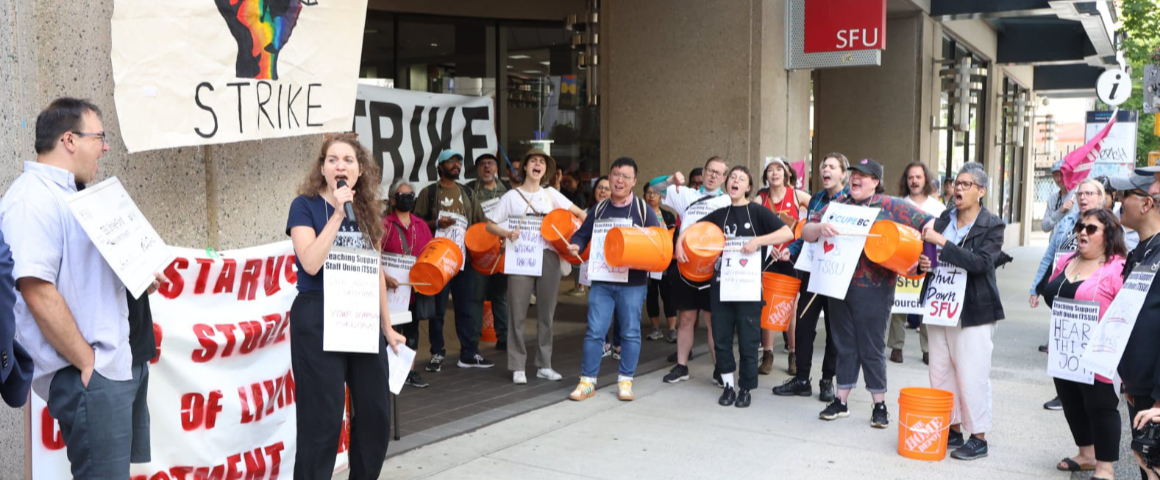PV staff
Teaching assistants and sessional lecturers at Simon Fraser University (SFU) are entering the fourth month of strike action against the university. The workers, who are represented by the Teaching Support Staff Union (TSSU), have since June 19 been using rotating picket lines and other actions such as an overtime ban and classroom strike discussions (teach-ins).
The union’s collective agreement expired over a year ago, in April 2022. TSSU says it had over 30 bargaining sessions at which is repeatedly proposals to address members’ needs. These include improvements to wages and benefits (like mental health and dental coverage) that are sufficient to offset inflation, as well as housing costs, tuition and childcare; issues relating to overwork, including prep time and compensation that matches increasing class size; increased job security and access to technology and equipment to support remote, hybrid and blended work.
TSSU says that these issues are ones that its members have faced for over a decade and that prior to the pandemic the union had productive discussions with the employer. However, the current administration has taken a very different tone, with TSSU saying that “the response from the employer has been to say no outright, to delay, or to insist improvements would have to be offset with monetary concessions.”
SFU has tabled several concessions including eliminating seniority for sessional lecturers and their earned right to a temporary promotion as a limited term lecturer with higher pay, longer duration and more benefits; removing the scholarship portion of TA pay so that it decreases the take-home pay for graduate students; and severely weakening health coverage for international students. TSSU also says that SFU’s monetary proposals are below the rate of inflation, “effectively forcing a pay cut on our members.”
Unwilling to agree to these kinds of concessions, and in need of wage and benefit improvements, union members delivered a 91 percent strike mandate.
Typically, teaching assistants are paid $750-850 biweekly, depending on if they are a MA or a PhD student. From these wages, they must pay housing, food and tuition costs. While wages have remained the same over the past few years, education and living costs have increased dramatically. TSSU says that many of its members must work multiple jobs, in addition to their academic work, just to afford to live and study in the province.
Furthermore, teaching support staff have to reapply for work every semester, so they don’t know if they even have a job until a month before the semester starts.
The strike has received strong community and labour solidarity. Within just two weeks of picket action, TSSU received over $250,000 in financial support from the labour movement, including $200,000 from the BC General Employees’ Union (BCGEU).
TSSU is asking faculty, students, community and labour organizations to support the strike by respecting picket lines, writing BC’s Minister of Advanced Education Selina Robinson, and donating to the strike fund.
Send solidarity messages to tssu [at] tssu.ca and E-transfer donations to strikefund [at] tssu.ca
Get People’s Voice delivered to your door or inbox!
If you found this article useful, please consider subscribing to People’s Voice.
We are 100% reader-supported, with no corporate or government funding.




